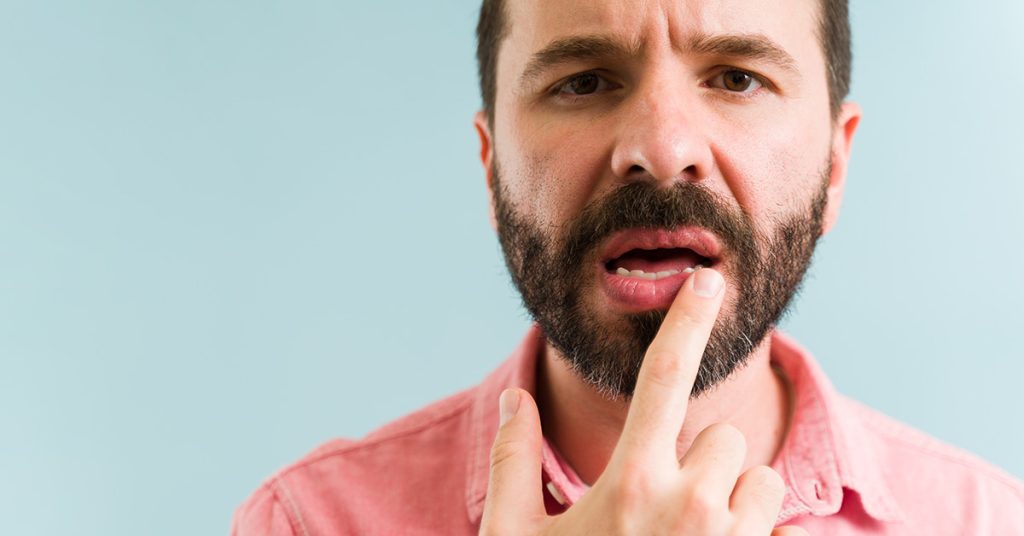A lot of us, sometimes without knowing it, suffer from dry mouth and its consequences. If you have never heard about it, Dr. Yamamah Al Jader explains everything you have to know in this article.
Dr Al Jader explains that dry mouth is the presence of a symptom that leads to a lack of saliva. A person with dry mouth will therefore not have enough saliva to keep their mouth wet. It is sometimes also called xerostomia, waterlessness, cottonmouth, drouth, dryness, or xerotes.
What causes dry mouth?
When it comes to dry mouth, the causes are many. Most of the time, they can be identified quickly as the person will recognize what is going on in their life at the moment and link it to an unusually dry mouth. Dr. Al Jader takes us through the possible causes:
- Medications. Many medications out there can be the cause of dry mouth. These can often include antihistamines, decongestants, anti-hypertensive medications, antidiarrheals, muscle relaxants, atropine, urinary continence drugs, some Parkinson’s disease medications, as well as a number of antidepressants. Side effects are real and should be considered.
- Age. It is important to highlight the fact that dry mouth is not a natural part of aging. However, older adults usually take more medications than the rest, which, in turn, can cause dry mouth.
- Cancer treatment. Radiation and chemotherapy Radiotherapy can damage the salivary glands, meaning less saliva will be produced in the mouth.
- Injury or surgery. Some injuries and surgeries can result in nerve damage to the head and neck area, causing dry mouth.
- Tobacco. Either chewing or smoking tobacco increases the risk of dry mouth symptoms.
- Dehydration. This is mostly caused by a lack of sufficient fluids in the body.
- Exercising or playing in the heat. Dry mouth will be more likely if this goes on for a long period of time.
- Some health conditions, illnesses, and habits can also cause dry mouth, such as:
- Diabetes
- Anxiety disorders
- Depression
- HIV/AIDS
- Parkinson’s disease
What are the signs and symptoms of dry mouth?
Dr. Al Jader explains that a person will know whether they have dry mouth when he or she recognises some of the following signs or symptoms:
- Bad breath- halitosis
- Cheilitis or inflammation and fissuring )splitting or cracking) of the lips
- Cracking and fissuring of the oral mucosa, or inner lining of the cheeks and lips, in which skin at the corners of the mouth may split or become sore, with a burning sensation
- Dryness in the mouth
- Dysgeusia, or taste disorders
- Fungal infections in the mouth, such as thrush or candidiasis
- Glossodynia, or a painful tongue
- Increased need to drink water, especially at night
- Inflammation of the tongue, tongue ulcers
- Lipstick sticking to teeth
- More frequent gum disease
- More tooth decay and plaque as oral PH decreases
Experiencing dry mouth? Here are basic things you can do
According to Dr. Al Jader, individuals who want to avoid dry mouth should also avoid the following:
- Chewing or smoking tobacco
- Sugary foods or drinks
- Acidic foods or drinks
- Dry food
- Spicy foods
- Astringents
- Excessively hot or cold drinks
- Alcohol consumption should be kept to a minimum or avoided altogether, and caffeine should be only consumed in moderation.
How can I treat dry mouth?
Dr. Al Jader explains that treating dry mouth will depend on several factors. First, a dentist will check whether the patient has an underlying condition or disease, or is taking certain medications that may be causing dry mouth. However, if an underlying cause is found, steps need to be taken to minimize its effect.
If dry mouth is caused by a particular medication the patient is taking, the doctor will either alter the dosage or prescribe another drug that is less likely to cause dry mouth.
Moreover, medication may be prescribed to stimulate the production of salivae, such as pilocarpine (Salagen) or cevimeline (Evoxac).
According to Dr. Al Jader, experts say that symptomatic treatment for dry mouth includes four areas:
- Increasing the flow of saliva
- Replacing lost secretions (saliva substitutes)
- Controlling dental caries
- Specific measures, such as treating infections
In conclusion, a patient with a dry mouth should pay special attention to his or her oral and dental hygiene. Regular plaque removal and paying attention to the treatment of gingival infections, inflammation, and dental caries, are a must. Of course, proper brushing of teeth and flossing regularly is of high importance. It is also important to use fluoride daily. Teeth should be cleaned twice daily using a soft-bristled toothbrush and mildly flavored low abrasive fluoride toothpaste. Products containing sodium lauryl sulfate should be avoided.
It is important to note that sodium fluoride rinses should be held in the mouth for at least 1 minute. Fluoride gel can be applied with a toothbrush 2 to 3 times and left in before expectorating. No food or beverage should be consumed for at least 30 minutes after fluoride application. And last but not least, the use of chlorhexidine mouthwash rinses can prevent caries.
For effective oral care products, we recommend the Elgydium products




